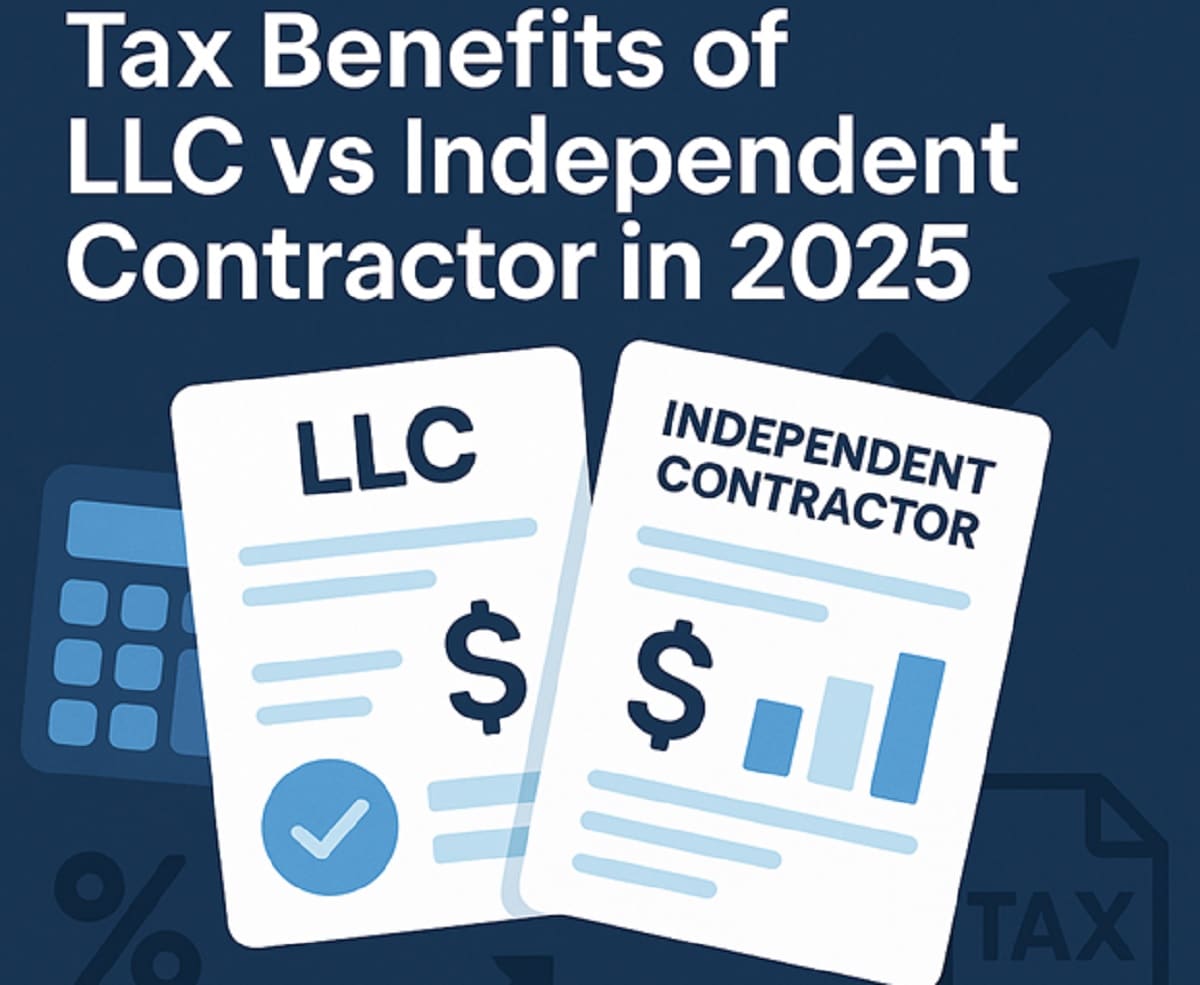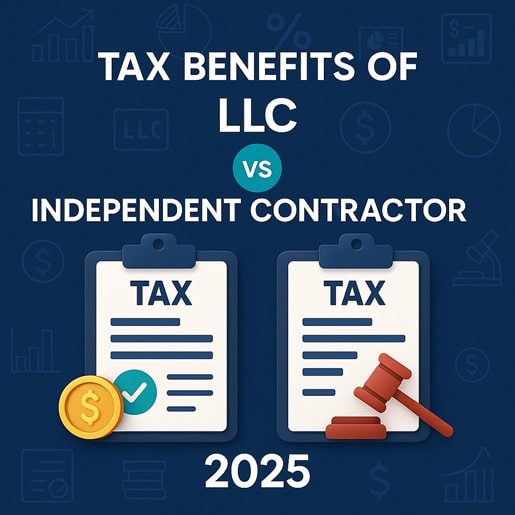Learn about some of the major tax advantages and variations between LLCs and independent contractors. Get to know how each of them affects deductions, liability, and net income.
What Is an LLC and How It Works?
Limited Liability Company (LLC) is a form of legal business entity that is a combination of a sole proprietorship and a corporation with regard to its flexibility and limited liability respectively. It enables individuals or more than one owner referred to as members to run a business without the interference of their personal resources with the company debts and obligations. This isolation means that personal savings, house or car of the member are usually safe in case of a lawsuit or financial damages.
An LLC has great benefits in terms of taxation. It is considered as a pass-through entity, i.e. the company does not directly pay tax to the federal government in terms of income. Profits and losses instead flow through the owners, who report them in their personal tax returns. This prevents the incident of the second taxation which is common among companies.
The other significant advantage of the creation of LLC is that it has a great degree of flexibility in the filing of tax returns. Single-member LLCs are by default taxed like sole proprietorships and multi-member LLCs are taxed like partnerships.
Nevertheless, the owners of LLCs have a chance to be taxed as S-Corporation or C-Corporation that can save them self-employment tax and access more deductions. Overall, LLC offers a reasonable compromise when it comes to legal protection, flexibility in taxes, and easier management, thus becoming a strong choice among businesspeople and small enterprises.
Who Is an Independent Contractor?
An independent contractor refers to an employee who offers services of a company or client on a contractual basis and is not an employee of the company. The independent contractors have the freedom to determine the place where, when, and how the work is done as opposed to traditional employees. They should control their business activities, rate, and the relationships with clients on their own. This freedom gives more freedom but with additional financial and management burdens.
The IRS treats independent contractors as sole proprietors with regard to tax. They must indicate their income on Schedule C of their personal income tax return and pay self-employment taxes, including Social Security and Medicare taxes.
Contrary to employees, no automatic taxes are deducted on their income, and therefore the contractors usually remit quarterly estimated taxes in order to ensure compliance over a year.
Such as freelance or projects based industries, independent contracting is prevalent in such industries. Among them are graphic designers, consultants, software developers, writers, real estate agents and gig-economy workers.
Through this set up professionals have the autonomy to serve various clients and earn as much as they can depending on competency and need. That, however, would not be without disciplined record keeping and management of finances to make sure that the taxes are correctly filed and that the deductions are claimed correctly.
Tax Benefits of an LLC
Among the most appealing features about the creation of a Limited Liability Company (LLC) is the preferable taxation. LLCs are provided with pass-through taxation, implying that the company income is not subject to corporate taxation. Rather, the owner reports the profits and losses personally on the personal tax filing, which helps him/her to escape the double taxation. This structure simplifies the process of business owners to deal with taxes and the ability to retain greater profits.
The other significant benefit of LLC is that it has more flexibility in deducting the expenses of the business. The costs that can be written off by the owners are enormous and they include office supplies, rent, equipment, travel, marketing and even insurance premiums incurred by the health as long as they are business related. The deductions lower the taxable income, and this assists the owners save a lot at the tax season.
Moreover, the owners of LLCs may decide to become S-Corporations that may be better tax-saving. In this way, the owners can characterize a portion of their income as a salary and the remaining part as a distribution, which might decrease self-employment taxes. This election gives the option of organizing the income in a more efficient manner regarding taxation based on the revenue of the business.
Finally, an LLC establishes a distinction between individual and corporate expenditures. This makes it easier to do accounting as well as enhances legal security in the event of audits or disagreements. This separation of finances helps the owners to have superior control of their records and to ensure that they comply with the laws of taxation. All in all, the LLC structure provides financial efficiency along with a sense of freedom to the entrepreneurs in search of organized but free-flowing tax benefits.
Tax Advantages of an Independent Contractor
There are also some benefits of not being an employee and being an independent contractor, particularly, those who are fond of simplicity and flexibility. The independent contractors have it easy since they file their taxes as sole proprietors unlike LLCs. They do not need to file complicated company returns as they report all the income and expenses in the Schedule C of their own tax returns. This is simple and this attracts freelancers, consultants and small service providers who would prefer to have minimal paper work.
The administrative cost is also lower since independent contractors do not have to pay the fees of state filing, annual reports, and registered agents that LLCs have to pay. This makes business activities small and cost effective especially when one is just beginning a career or a part-time employee.
The second key advantage is that one can claim direct deductions with regard to work-related expenses. The costs to be deducted by contractors include tools, equipment, internet bills, professional subscriptions and even the mileage that was incurred in traveling in the course of business. These allowances have the potential to lower taxes and maximize earning power.
The best of it all is perhaps the freedom and the control that is involved in independent contracting. Contractors can choose the amount of work hours, their customers and rates to give them complete control over their business.
They are capable of increasing or decreasing levels of workload and personal objectives with ease. Although they still pay self-employment tax, the ability to control income, expenses, and deductions with no corporate limitations is what makes independent contracting a big favorite among freelancers and individuals who like to start their own business.
LLC vs Independent Contractor: Key Tax Differences
Comparing the two systems, LLC and independent contractor, it is necessary to understand how each system treats taxes, deductions, and compliance. They both have benefits, though their tax obligations vary in major aspects.
The Ways Each Person pays Income and Self-Employment Taxes
- Independent Contractor Has to pay self-employment tax (including Social Security and Medicare) on all net earnings. The income is disclosed with the annual personal tax return with Schedule C.
- LLC Owner Is free to determine the tax structure to use; can be either a sole proprietor, partnership or S-Corporation.
- The decision of being an S-Corp means that a proprietor pays personal income tax as a salary and then claims the rest of the profits as distributions, which could reduce self-employment taxes.
- The flexibility of the LLCs in structuring income may be used to save a lot of tax to growing businesses.
Disagreements in Allowable Deductions
Basic costs related to business by the Independent Contractor include:
- Home office and equipment
- Internet and phone usage
- Mileage and travel expenses
- Professional services (accounting, legal, etc.).
The LLLCs usually receive wider deductions, including:
- Payrolls and benefits of employees.
- Start up and running expenses.
- Asset and machinery depreciation.
The deductible expenses are usually more extensive when it comes to LLCs because they are more formal and have prospects of employing workers.
Recordkeeping/ Compliance Requirements
A) Independent Contractors:
- Basic recordkeeping – primarily receipts, invoices, and an income and expenses ledger.
- There is normally one schedule (Schedule C) in tax filing.
B) LLCs:
- Should have distinct bank accounts, elaborate bookkeeping and occasionally annual state returns and payments.
- Necessary to maintain operating agreements and tax books to show distinction between personal and business financials.
- The LLC needs more documentation, but it is more legally and financially organized.
IRS Viewpoint of the Two types of business.
The IRS treats both as self-employed tax-wise but takes them differently:
- The independent contractors are individual earners that have straightforward reporting.
- LLCs are considered as legal entities and they are required to undergo more elaborate tax filing processes depending on the choice (election default or S-Corp).
The IRS closely monitors:
- Appropriate categorisation of income.
- Right use of business deductions.
- Personal expense claims to be avoided on business accounts.
- Being more complicated, LLCs may seem more legitimate to both the IRS and clients, which may improve the trust and reputation of a business.
When an LLC Makes More Sense
The optimum business form to select is LLC when the professional or owner of the business aims in the long term benefits that are both financial and legal in nature. It is particularly useful among individuals that have steady or increasing streams of income.
LLC makes a better option in case:
- Your earnings are also good to deserve the S-Corporation tax election to enable you lower the self-employment taxes by way of salary and distributions.
- Protection on liability- LLCs protect your personal assets (home, savings, etc.) against business debts or lawsuits.
- You intend to expand either through hiring of employees, through taking investors or signing business contracts that are organized under a registered name.
- Your desire is to establish business reputations with customers, suppliers and financial institutions.
- The drawbacks are setup costs and more recordkeeping but the protection and tax optimization usually gains more weight than these disadvantages to serious entrepreneurs.
When It Is Better to Remain as an Independent Contractor
In cases of freelancers or small scale operators, it may be most viable to stay as an independent contractor. The model makes it simple, cheap and adaptable.
Independent contracting is preferable when:
- It is an irregular or modest income, like part time or gig work.
- It is about simplicity and cheapness – no one necessarily has to pay any formation fee and annual LLC reports are not necessary.
- You do not need a formal legal protection and brand under business name.
- You like to have things your own way and would rather do without the extra compliance overhead.
- Independent contractors conserve both time and money in administration and assume a greater amount of personal risk as their business is not legally separate.
Comparison of the Real-World Examples
We can take the example of two professionals:
- Sarah is a freelance designer who is an independent contractor.
- Michael, is a consultant that is registered as LLC with S-Corp election.
Tax Impact:
- Sarah will be filing Schedule C and pays all her income as self-employment tax (15.3) on her entire net income.
- Michael charges himself a decent salary after which he uses other profits as dividends, thus cutting down the amount liable to self-employment tax.
Deductions:
- Sarah expenses her equipment, software, and home office.
- Michael also deduces health insurance premiums, retirement and probably employee salaries through his LLC.
Take-Home Comparison:
- Sarah may pay approximately 18,000-20,000 on self-employment tax on her annual income of 120, 000.
- Michael with S-Corp structure would save 4,000-6000 every year in taxes but would have the benefit of liability protection.
This example indicates the way in which LLC structure may raise net take-home pay and may provide a more professional business growth framework.
Conclusion
The LLCs and independent contractors have advantages with regards to taxes as well as business. It is more flexible, protected and credible which is ideal since an LLC is better suited to earners with higher incomes as well as those intending to expand. Meanwhile, being an independent contractor makes it very simple, cheap, and customizable to one person or a part-time professional.
It is prudent to speak to a tax professional or accountant before taking the road to determine how much you earn, where you want to go and within what legal boundaries of your state. A proper choice can not only cost you thousands of money in taxes, but also provide a good base to your successful business.

































